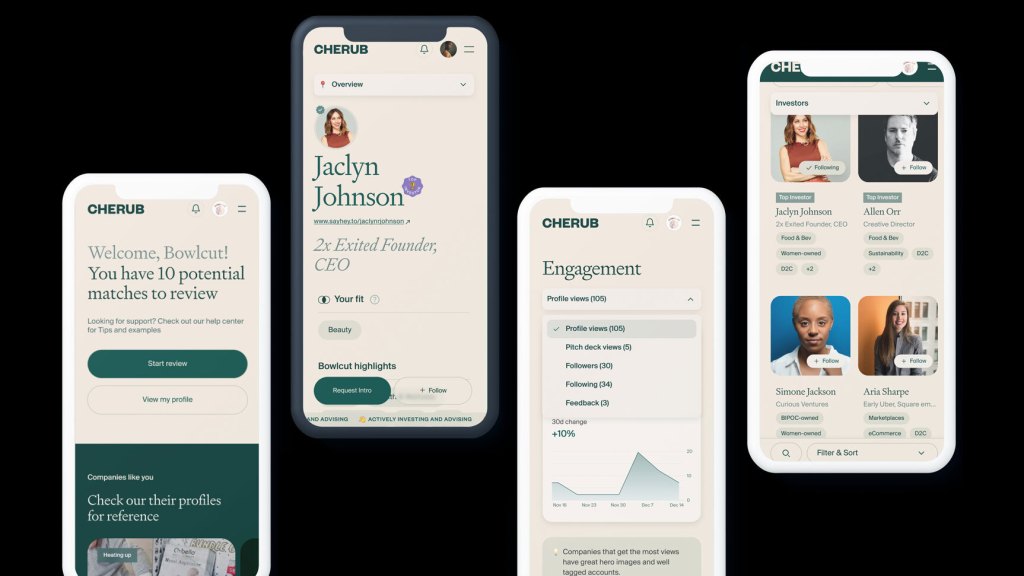[ad_1]

Image credits: Cherub
Jaclyn Johnson and Angeline Vuong were on a walk deliberating about how difficult it can be for people to get started with angel investing when they realized they had stumbled upon a startup idea.
Today they are the co-founders of Cheruba market that unites angel investors with entrepreneurs.
Vuong spent nearly five years working on product and growth at Opendoor. Johnson founded Create and cultivatea self-described “media company for ambitious women” and had He experienced both sides of the investing world: as a founder and investor. Before starting Create & Cultivate, Johnson sold his own startup. (No Topic) in 2016 and invested in numerous companies, including luggage company Away.
Johnson compares Cherub, who lives in Los Angeles, to Raya, a membership-based online community for datingin the sense that it matches founders and angel investors according to their preferences.
“You can come on this platform as an entrepreneur and you can come on the platform as an angel investor and get access to both people and express interest based on the tags,” he said in an interview with TechCrunch. “So, for example, if I go on the app and I’m interested in women-owned companies in the CPG space that are doing their Series A or something specific, I’ll get a shallow deal flow that more closely matches what I’m looking for. “
With Cherub, investors and entrepreneurs can see who is interested in them on the back end. If they are also interested, they can indicate it as such and it matches. Conversely, if an investor approaches a founder but that founder doesn’t see him as a good fit, he may decline the invitation to connect. Or if an entrepreneur’s minimum investment is $25,000 but an angel investor only invests $10,000 per deal, he may see that and not reach out to connect.
“In some ways we’re using the mechanics of dating apps,” Johnson said. “That’s why we jokingly call it Raya for transaction flow.”
Membership Based
To test Cherub’s concept, Johnson and Voung launched a weekly newsletter last year that garnered 1,500 subscriptions in three weeks through word of mouth alone.
Encouraged, the pair created an alpha product last summer that included about 40 companies and offered investors a way to apply for a platform. All 40 received requests to view the terrace, Johnson said. Half of those platform views resulted in an introduction, he said, where investors expressed that they were interested in being introduced by the founder. Twenty percent of those pitches ended up being funded in less than three months, collectively raising $1.1 million in capital.
Of those deals, 40% were new angel investors, meaning they were accredited investors who had never written checks before.
Cherub is now in the process of a slow launch, with 100 startups on the platform generating $50,000 in revenue. They plan to increase that number to 500 and have a waiting list of 1,500 new businesses, Johnson said.

Image credits: Co-founders Jaclyn Johnson and Angeline Vuong/Cherub
Cherub is free to use for investors and charges startups through a membership model. A $480/year membership allows founders to list their companies in the directory and includes analytics such as how many people viewed their pitch. Cherub Select membership costs $950 a year and involves a more vetted process to more actively showcase the company to investors, Johnson said.
Johnson said Cherub also helps founders find incubators and accelerators and has partnerships with incubator partners from companies like Andreessen Horowitz, Dream Ventures and New York Fashion Tech Lab.
Investors also get access to data such as “updates on how a company is performing, whether or not they are collecting and how much,” Johnson said.
Of course, Cherub is not the only platform that brings together angels and entrepreneurs. AngelList is the largest and best known. Israeli crowdsourcing company OurCrowd is also huge, and then there are those offered by venture companies, such as Hustle Squad. angel squad for accredited investors, or others like Jason Calacanis The Union.
But Cherub is different in several ways, Johnson says. On the one hand, features startups with an emphasis on consumer packaged goods (CPG) companies. Although it also includes AI companies, hotel projects and apps, among others.
AngelList is more of a B2B platform, is very focused on the technology industry and is best for those who already have knowledge or experience in startup investments and can afford to invest quite considerable amounts, in Johnson’s opinion.
Then there’s Wefunder or Republic crowdsourcing, which will allow investors to invest small amounts, sometimes as little as $100, which Johnson describes as “the driver of angel investing.”
Cherub sits in the middle, he says. For example, like traditional venture capital firms, the firm hosts “founder-funder mixers.” Last year, for example, Cherub partnered with the Sophia Amoruso Trust Fund to host a cocktail party where “everything about the venue could be invested in,” like the drinks served and a pop-up shop where guests could ” buy whatever products they want to try.”
“From that event alone, over $400,000 in deals were generated,” Johnson said.
Angel investor Allen Orr told TechCrunch that he had used other platforms like AngelList in the past.
“However, I felt like it wasn’t a very personal experience and seemed too transactional,” he told TechCrunch via email. “What attracted me to Cherub was the idea of a social and personalized approach to investing,” she said, adding: “I also liked that there are opportunities not only to invest but also to advise brands.”
Maggie Rose Macar, founder and CEO of a mental health support app ZantonHe said an investor wrote a $25,000 check to his company after it was featured in an early version of Cherub’s newsletters and after meeting the investor in person at one of Cherub’s events.
“I think Cherub does a great job of bringing active investors into the room with founders who are looking,” he told TechCrunch.
Cherub has raised $1.25 million of her own, naturally from angels including Drybar’s Alli Webb and Blavity’s Morgan DeBaun, among others.
[ad_2]
News source


